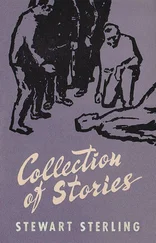They sat down in a sun-drenched porch, open glass on three sides. Leona brought in two glasses of orange juice, with the pulp shreds all settled at the bottom from standing too long.
“Wabble ’em around a little,” she suggested cheerily; “dat makes it clear up.”
Jackie Blaine believed in letting servants express their individualities. When you’re a good deal behind on their wages, you can’t very well object, anyway.
Gil’s face looked even more drawn down here than it had in the lesser sunlight upstairs. Haggard. But his mood had cleared a little. “Before long, we’ll sit breakfasting in the South American way — and will I be glad of a change of scene!”
“There won’t be much left to travel on, if you take care of our debts.”
“If,” he said half audibly.
The phone rang.
“That must be Burroughs, asking us to forward his bag.” Jackie Blaine got up and went in to answer it.
It wasn’t Burroughs, it was his wife.
“Oh, hello,” Jackie said cordially. “We were awfully sorry to hear you were laid up like that and couldn’t come out with Mr. Burroughs. Feeling any better?”
Mrs. Burroughs’ voice sounded cranky, put out. “I think it’s awfully inconsiderate of Homer not to let me know he was staying over another day. He knew I wasn’t well when he left! I think the least he might have done was phone me or send a wire if he wasn’t coming, and you can tell him I said so.”
Jackie Blaine tightened her hold on the telephone. “But, hold on, Mrs. Burroughs. He isn’t here any more; he did leave, early this morning.”
There was a startled stillness at the other end. Then: “Early this morning! Well, why hasn’t he gotten here? What train did he take?”
Jackie swiveled toward her husband, telephone and all. She could see him sitting out there from where she was. “Didn’t you say Mr. Burroughs took the milk train, Gil?”
She could see the gnarled lump of his Adam’s apple go all the way up, then ebb down again. Something made him swallow, though why he should swallow at that particular point — his cup wasn’t anywhere near his lips. Unless maybe there was some coffee left in his mouth from before, that he’d forgotten to swallow till now. He didn’t move at all. Not even his lips. It was like a statue speaking — a statue of gleaming white marble. “Yes, that’s right.”
Somehow there wasn’t very much color left in her own face. “What time would that bring him in, Gil?” She always used the car herself.
“Before eight.” She relayed it.
“Well, where is he then?” The voice was beginning to fray a little around the edges.
“He may have gone direct to his office from the train, Mrs. Burroughs; he may have had something important to attend to before he went home.”
Still more of the self-control in the other woman’s voice unraveled. “But he didn’t, I know he didn’t! That’s why I’m calling you; his office phoned a little while ago to ask me if I knew whether or not he’d be in today.”
“Oh.” The exclamation was soundless, a mental flash on Jackie’s part.
The voice had degenerated to a pitiful plea for assistance, all social stiffness gone now. It was the frightened whimper of a pampered invalid wife who suddenly has the tables turned on her. “But what’s become of him, Mrs. Blaine?”
Jackie said in a voice that sounded a little hollow in her own ears: “I’m sure there’s nothing to worry about, Mrs. Burroughs; I’m sure he’s just unavoidably detained somewhere in town.” But somehow she caught herself swallowing in her turn now, as Gil had before. It was such a straight line from here — or rather from the station out here — to his home, how could anything possibly happen to anyone traveling it?
“He was feeling all right when you saw him off, wasn’t he, Gil?”
He started up from his chair, moved over to one of the glass panels, stood staring out, boiling smoke.
“Leave me out of it for two minutes, will you?” His voice came back to her muffledly.
That “Leave me out of it” blurred the rest of the conversation as far as she was concerned. The voice she was listening to disintegrated into sobs and incoherent remarks. She heard herself saying vaguely: “Please don’t worry... I feel terrible... Will you call me back and let me know?” But what was there she could do? And she knew, oh, she knew that she didn’t want to hear from this woman again.
She hung up. She was strangely unable to turn around and look toward where Gil was standing. It was a physical incapacity. She felt almost rigid. She had remained standing during the entire conversation. She sat down now. She lighted a cigarette, but it went right out again because she didn’t keep it going. She let her head fall slowly as of its own weight forward into her upcurved hand, so that it was planted between her eyes and partly shut them out.
She didn’t want any more breakfast.
She saw the man get out of the car and come up to the house. She knew him by sight. He’d been here before. This was about three that afternoon, that Monday afternoon, the day Burroughs had — gone. He had a cheap car. The sound of it driving up and stopping was what had made her get up off the bed and go over to the window to look. She’d stopped crying by then anyway. You can’t cry all day long; there isn’t that much crying in you.
Then when she saw who it was — oh, that wasn’t anything. This was such a minor matter — now. And of course it could be taken care of easily enough — now. She stayed there by the window, waiting to see him walk out to his car and drive off again, within five minutes at the most — with the money he’d come for. Because Gil was down there; he could attend to it and get rid of him for good — now. Then there’d be one fewer to hound the two of them.
But the five minutes were up, and the man didn’t come right out again the way she’d expected him to. He seemed to be staying as long as those other times, when all he got was a drink and a lot of build-up. Angry voices filtered up to her — one angry voice, anyway, and one subdued, placative one.
She went outside to the head of the stairs and listened tautly. Not that this was new to her, but it had a new, a terrible significance now.
The angry voice, that of the man who had come in the car, was barking: “How long does this keep up, Blaine? You gimme that same run-around each time! You think all I gotta do is come out here? Look at this house you live in! Look at the front you put up! You mean you haven’t got that much, a guy like you?”
And Gil’s voice, whining plaintively: “I tell you I haven’t got it this minute! What am I going to do, take it out of my blood? You’re going to get it; just give me time.”
The angry voice rose to a roar, but at least it shifted toward the front door. “I’m warning you for the last time, you better get it and no more of this funny business! My boss has been mighty patient with you! There are other ways of handling welshers, and don’t forget it!”
The door slammed and the car outside racketed up and dwindled off in the distance.
Jackie Blaine crept down the stairs a step at a time toward where Gil was shakily pouring himself a drink. Her face was white, as white as his had been that noon when they first got up. But not because of what she had just heard. Still because of its implication.
“Who was it?” she said hoarsely.
“Verona’s stooge. Still that same lousy personal loan he once made me.”
“How much is it?”
“Six hundred odd.”
She knew all these things; she wanted to hear it from him. She spoke in a frightened whisper: “Then why didn’t you give it to him? You have twenty-five hundred on you.”
Читать дальше












